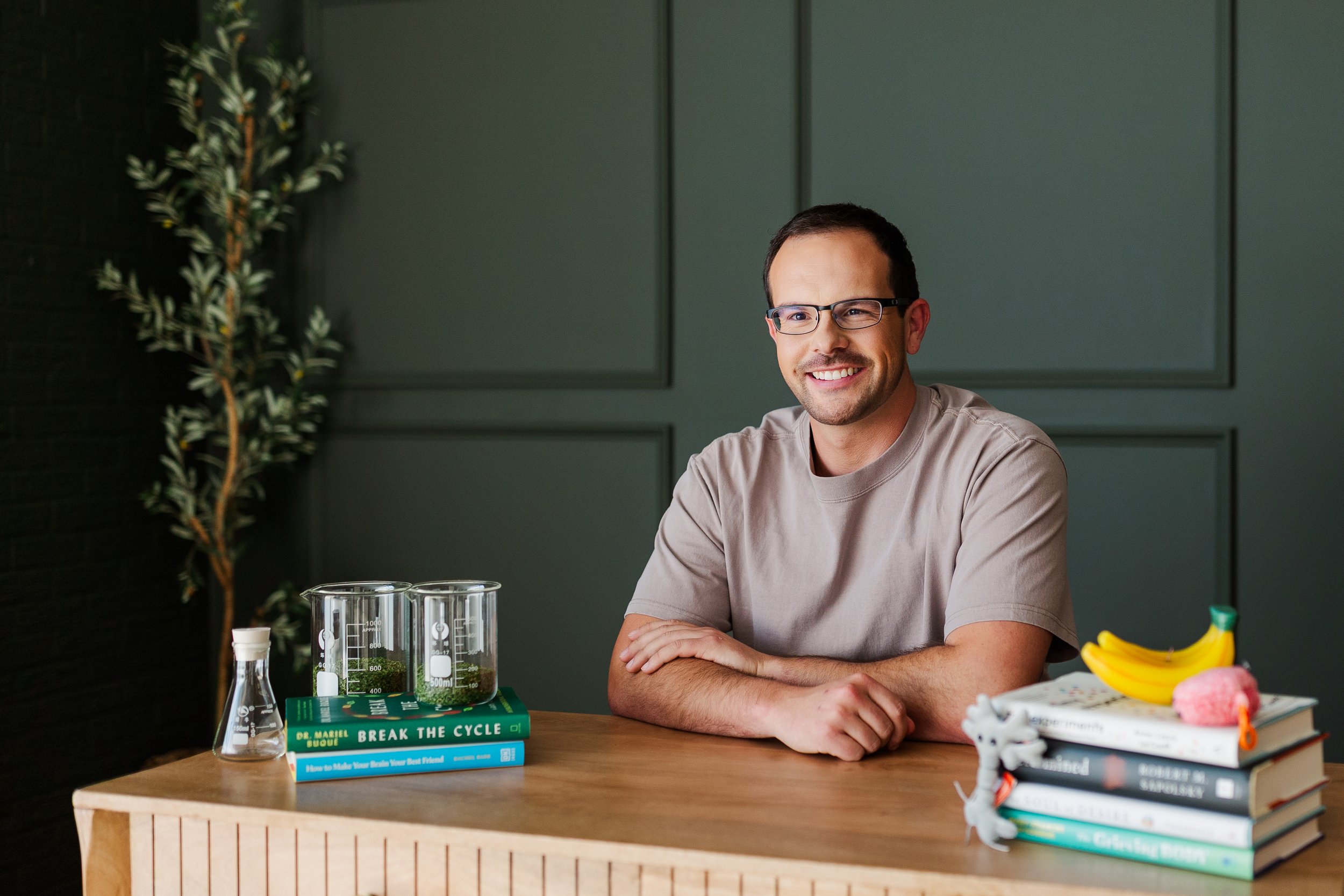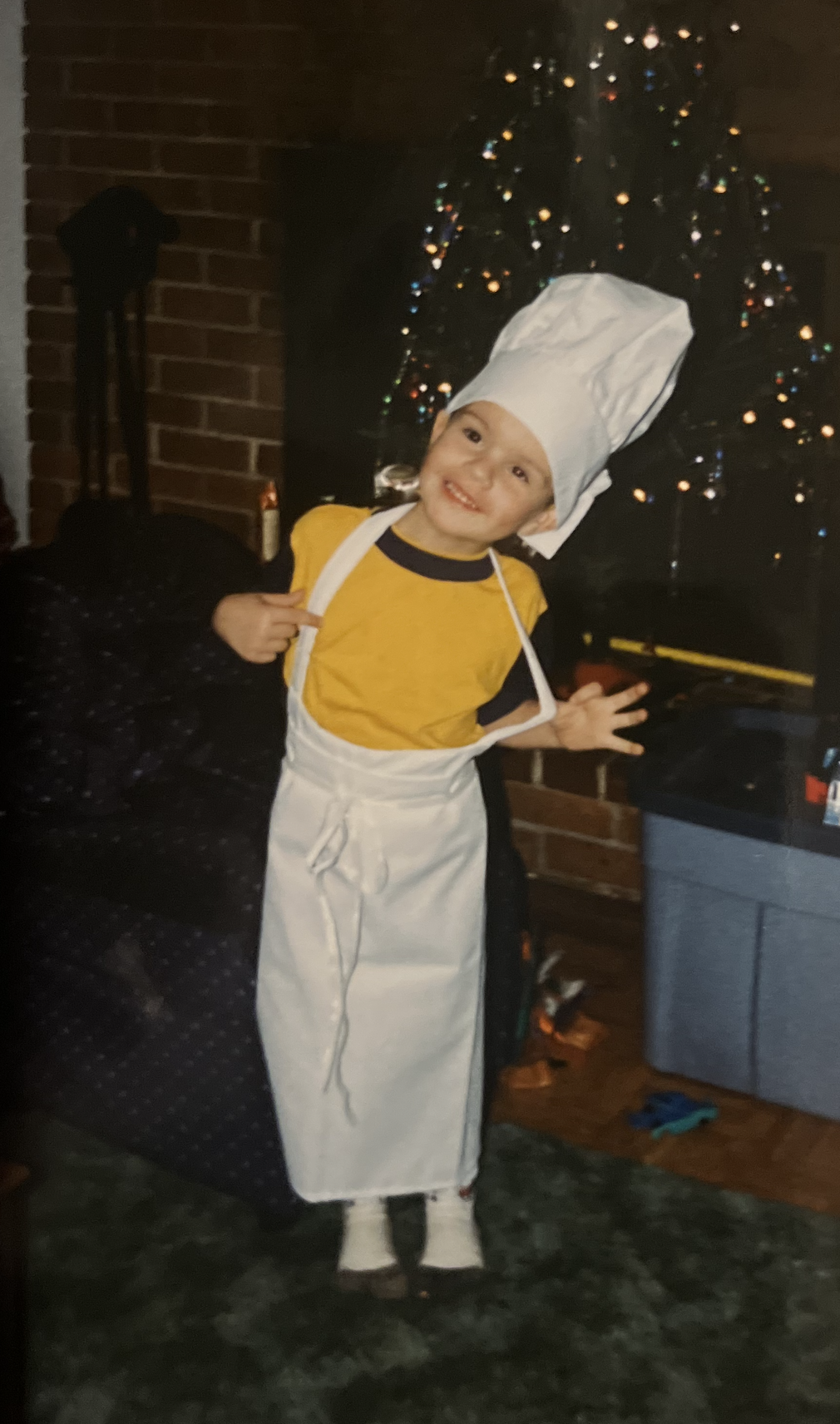
ABOUT
Hey there! I’m Timothy Frie.
If you’re reading this, chances are you stumbled across me on social media, heard me speak on a podcast, read my contributions to a news article, or someone you know and trust told you about my work. Regardless of how you arrived here, I appreciate your curiosity about me.
Professionally, most people know me as a neuronutritionist, nutritional neuroscientist, public scholar, educator, writer and founder of the National Academy of Neuronutrition and the National Center for Neuronutrition. I’m also the host of the upcoming podcast, Cognivore. My work has been featured in a variety of international and national publications, and more than 48,000+ people have followed along on social media.
Generally speaking, my work is focused on deepening our understanding of how the ways our brains respond to childhood traumatic stress influence our nutritional behavior as adults.
I seek to answer the question:
How might the traumatic experiences we endured as children influence how we eat as adults?
In the past, I taught thousands of students across more than 200+ countries, and helped shape the next generation of health professionals through my work with some of the world’s largest health coaching, fitness, and nutrition education organizations such as the International Sports Sciences Association (ISSA), American Fitness Professionals and Associates (AFPA), American Public Health Association (APHA), and Knowfully Learning Group (KLG.)
I also worked as a community nutrition educator, working directly with individuals and families in under-resourced communities to make nutrition feel more accessible, practical, and relevant to their everyday lives, and do so in ways that aligned with their circumstances, cultures, and capacities. I quickly became known for helping people feel more confident feeding themselves and their families and make food choices without shame or overwhelm.
I’m particularly interested in supporting the population of people who:
Experienced early childhood trauma as a result of abusive and neglectful caregivers
Grew up in a food insecure household or food desert
Have an extensive family medical and mental health history
Were diagnosed with a a chronic digestive, autoimmune or neurological condition in early-adulthood
Spent years struggling with disordered eating, an eating disorder, and/or chronic dieting
Are high-masking neurodivergent and/or gifted
Pursued “high-achievement” career and academic paths in healthcare, tech, law, finance, or entrepreneurship
Find it challenging to eat well and meet their nutritional needs without guilt, shame or fear
Why this population?
Because I’m part of it.
So much of what I have done and continue to do is deeply rooted in a genuine desire to prevent others (or at least mitigate the harm) from experiencing what I did.
Through my courses, trainings, and work with people one-on-one, I walk alongside others as they expand their capacity and curiosity for exploring how their life experiences have shaped their relationship with their health, their body and food.
By doing so, you can stop dieting, wasting your money on arbitrary supplement protocols, fearing healthy and nutritious foods, and shaming yourself for your relationship with food. In turn, you can learn how to trust yourself again, re-connect with your innate nutritional intelligence, and start eating with compassion, coherence and a sense of food-mind fluency.
I know from my own experience how essential it is to have someone else witness, hold, and support you as you do this work. So if you choose to work or learn with me in any capacity, I see it as an honor and privilege to the have opportunity to be someone that you’ve chosen to be a part of your journey.
I live with my partner, also named Tim (we have five Tim’s in our family), and our dog Fern, in the United States, on the ancestral and occupied territory of the Seminole and Miccosukee peoplese.
Some random facts about me:
My great grandfather, Willis Sipple, was a farmer
I was diagnosed with autism and ADHD in my late-twenties
Although one of my special interests is nutrition, I do not enjoy cooking
I grew up in Felton, Delaware, a small town with a total area of just 0.6 square miles
I’m blind in my left eye due to a rare congenital birth defect called optic disc coloboma
My body feels most at ease when I’m at a beach, by a fire, or looking at colorful produce
I love horror and dystopian sci-fi movies—especially if they involve zombies or a class war
When I was in high school, I won the Delaware Governor's Health and Human Services Award
A bit about my approach and education
-
I have studied and trained in a variety of theoretical frameworks and evidence-informed approaches and practices. I maintain an affirming, adaptable, compassionate, systems-informed, and integrative perspective that allows me to meet people where they are, with what they have, with respect to where they’ve been.
Neuronutrition
Precision and Personalized Nutrition
Systems Biology
Interpersonal Neurobiology
Health Behavior Science
Narrative Medicine
Medical Sociology
Trauma-Informed Care
Internal Family Systems (IFS)
Psychodynamic and Somatic Psychology
Salutogenesis
-
Doctor of Psychology from California Southern University (beginning 2026)
Three years of doctoral coursework in neurobiology, public health biology, interdisciplinary health education, and health policy from Bay Path University
Post-Master’s Certificate in Trauma-Informed Clinical Practice from New York University
Master of Science in Human Nutrition from University of Western States
Bachelor of Arts in Industrial and Organizational Psychology from Patten University
Certificate in Nutritional Psychology from the Center for Nutritional Psychology
Certificate in Trauma and Resiliency from Florida State University
Certified Nutrition and Wellness Educator (CNWE) by the American Association of Family and Consumer Sciences
Certificate in Value-Based Care from Western Governors University
Certificate in Nutritional Psychology from the Center for Nutritional Psychology
Certificate in Trauma and Resiliency from Florida State University
Certified Nutrition and Wellness Educator (CNWE) by the American Association of Family and Consumer Sciences
Designation as a Dr. Richard Merkin Health Scholar from the Institute for Advancing Health Value
Select professional development courses, seminars, and conferences focused on the topics of nutritional neuroscience, health behavior science, health psychology, neurodivergence, trauma-informed counseling, neuro-affirming care, medical humanities (bioethics, medical anthropology, and social medicine) narrative medicine, interfaith chaplaincy, and community care,
-
Robert Sapolsky, Jeffrey Brunstrom, André Fenton, Lisa Mosconi, Deanna Minich, Carl Jung, Lisa Olivera, Katie Kurtz, bell hooks, Audre Lorde, Irvin Yalom, J.S. Park, Andrea Nakayama, Rita Charon, Nadine Burke Harris, Courtney Tracy, Margaret Mead, Daniell Koepke, Mariel Buque, Rhonda Patrick, Hilary McBride, Paul Farmer, my friends and family, my pets, the animals and environment surrounding us, and the abundance of neuronutrients and elements that scaffold everything we understand as personality, mood, memory, emotion, belief, and thought.
Short Media Bio
Timothy Frie, DMS(c), MS, CNE is a nutritional neuroscientist, neuronutritionist, public scholar, and writer. He is the president of the National Academy of Neuronutrition, founder of the National Center for Neuronutrition, and host of the Cognivore podcast. His research is focused on understanding the impact of traumatic stress on nutritional behavior, particularly among neurodivergent adults with chronic neurological conditions. He has been featured in CBS, BBC, The Huffington Post, Newsweek, The Independent, Fox News, Epoch Times, Woman’s World, and Medical News Today, and is a regular guest on mental health and wellness podcasts.
“Timothy Frie’s approach to nutrition is profoundly enriched by his commitment to trauma-informed care, offering a compassionate and supportive environment that recognizes the deep-seated impact of trauma on overall health.
By skillfully integrating trauma awareness into his practice, Timothy ensures that clients feel seen, heard, and deeply understood, establishing a foundational sense of safety and trust that's essential for effective healing.
His practice not only acknowledges the physical symptoms but also addresses the emotional and psychological dimensions, restoring hope and empowering clients to reclaim their health through personalized and holistic care strategies.
Timothy’s dedication to trauma-informed principles fosters a therapeutic space where recovery is nurtured and every individual's healing journey is honored.
This is critical in the care we all crave!”
Andrea Nakayama, MS, CNE, FNLP
Founder, Functional Nutrition Alliance


